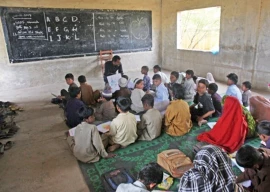1724268870-0/Supreme-Court-of-Pakistan-(2)1724268870-0.jpg)
Supreme Court's Justice Shahid Waheed has expressed wonder at the federal and provincial government's decision to engage private counsels to plead their Intra-court appeals (ICAs) against the apex court ruling that declared trials of civilians in military courts unconstitutional.
"This approach raised concerns about the possible misuse of public funds and unnecessary delays in the disposal of appeals affecting the lives and liberties of citizens.
"[This is] especially [so] when, in one appeal, the Attorney General under Article 100 of the Constitution is seeking the right to present arguments," Justice Waheed said in his additional note.
This additional note was part of an order through which a seven-member Supreme Court bench dismissed respondents' application against the federal and provincial government's decision to engage private counsels to present their arguments
A bench led by Justice Aminuddin Khan is hearing the ICAs filed against a five-member larger bench's October 23, 2023 verdict invalidating the military court trials of over 100 people accused of vandalizing the state properties on May 9, 2023.
Justice Waheed said it is important to briefly outline the background that explains the necessity of filing these applications.
"Several petitions were filed in this court under Article 184(3) of the Constitution, challenging the lawfulness of sections 2(1)(d)(i)&(ii) and section 59(4) of the Pakistan Army Act, 1952.
"The Federation of Pakistan was arrayed as one of the respondents in these petitions through various ministries such as defence, interior, law and justice, etc.
"The province of Balochistan was also a respondent in some petitions. After these petitions were allowed [on October 23, 2023], intra-court appeals were filed under section 5 of the Supreme Court (Practice and Procedure) Act, 2023.
"Instead of filing a single appeal on behalf of the Federation of Pakistan, each ministry was instructed to engage a private counsel to pursue their respective appeals. The Province of Baluchistan also engaged private counsel to pursue its appeal."
The SC judge noted that the federal government's approach of allowing ministries to file separate appeals was imprudent. One consolidated appeal was sufficient.
"Since we are not concerned here with the maintainability of multiple appeals, we will focus on the question that comes up for our determination: whether private counsel can be restrained from pleading on behalf of the government, given the circumstances.
"This question makes it necessary to review the scheme of law governing the legal practice of advocates before this court. It must be remembered that the license to practice law confers twofold rights on an advocate: the 'right to act' and the 'right to plead'.
The 'right to act' refers to taking steps to lay the case before the court, for instance, making an application or presenting a petition or appeal.
"No advocate can exercise this right for any person unless he has been appointed by a document in writing signed by such person or his authorized agent or some other person duly authorized by him to make such appointment, and such document has been filed in the Registry.
"A document appointing an advocate to act on behalf of any person is called Wakalatnama (power of attorney). Rule 15 of Order IV of the Supreme Court Rules, 1980 says that no advocate other than an Advocate-on-Record is entitled to act for a party in any proceeding in the Supreme Court.
"For this reason, in the cases at hand, the government has engaged Advocates-on-Record, and the applicants have not questioned their appointments and their right to act for the government, so there is no need to dilate further on this aspect.
"Given the facts, the filing of appeals on behalf of the government cannot be held invalid."
The SC judge said the "right to plead", as it suggests, is a right by which an advocate appears before the court to present and argue a position on behalf of a person or party.
Rule 6 of Order IV of the SC Rules, 1980 enacts that no advocate other than an Advocate-on-Record shall appear or plead in any matter before the court unless an Advocate-on-Record instructs him.
"In line with this rule, Form No.5 of Sixth Schedule to the Supreme Court Rules, 1980 provides a specimen of the Power of Attorney to Advocate-on-Record, which, among other things, gives power to an Advocate-on-Record "to appoint and instruct counsel".
"So viewed, it is under this power the Advocate-on-Record has appointed and instructed private counsel to argue the matter on behalf of the Government.
"Here, the applicants' objection needs consideration: when a competent and proficient Attorney General and his team were available to the Government, why were private counsel instructed to plead the Government's stance"
"The applicants sought strength in their argument from Rasheed Ahmad's case. (supra). This objection might have been weighty if it had been a case of a particular individual involving a simple question of law.
"On the contrary, the substantive questions involved in the appeals are out of the ordinary, with broad implications that will significantly impact the lives and liberties of citizens. These questions partake of the colour of criminal, constitutional and international human rights.
"Standing at the rostrum in the courtroom, the Attorney General stated that although he was conversant with criminal law, he lacked that much expertise which required to address the complex questions of criminal law so raised in appeals, and therefore, being compelled, private counsels have been engaged to render comprehensive and effective assistance to this Court in the public interest."
The judge appreciated the AGP's honesty and sincerity in admitting his limitations.
"His statement shows that he is a thorough professional and leads us to conclude that the engagement of private counsel was not for any improper motive.
"What's more, it is to be noted that the scope of appeal under section 5 of the Supreme Court (Practice and Procedure) Act, 2023, is also to be settled, and since all the questions raised in the appeals have never been brought before this Court for consideration, they ought to be discussed extensively to arrive at a sagacious answer.
"In my opinion, such a situation constitutes a "compelling reason" within the contemplation of Rule 14(1-A) of the Rules of Business, 1973, for engaging private counsel.
"It also meets the test set out in Rasheed Ahmed's case for engaging private counsel, which held that the engagement of a private counsel could only be sanctioned for compelling reasons and in the public interest and not to protect or save a particular individual or for any other ulterior reason.
"It has been brought to our notice that there has been no departure from the procedure for engaging private counsel. So, we find that the applicants' objection does not hold water.
"As a result, we conclude that private counsel, given the circumstances, cannot be restrained from pleading the cause of the government," he said.




1724302092-0/Taylor-Swift-(3)1724302092-0-165x106.webp)




1724268870-0/Supreme-Court-of-Pakistan-(2)1724268870-0-270x192.webp)
1724404034-0/Thumbnail-Template-(5)1724404034-0-270x192.webp)




1724394882-0/Thumbnail-Template-(2)1724394882-0-270x192.webp)

1724482162-0/Untitled-design-(3)1724482162-0-270x192.webp)






COMMENTS
Comments are moderated and generally will be posted if they are on-topic and not abusive.
For more information, please see our Comments FAQ